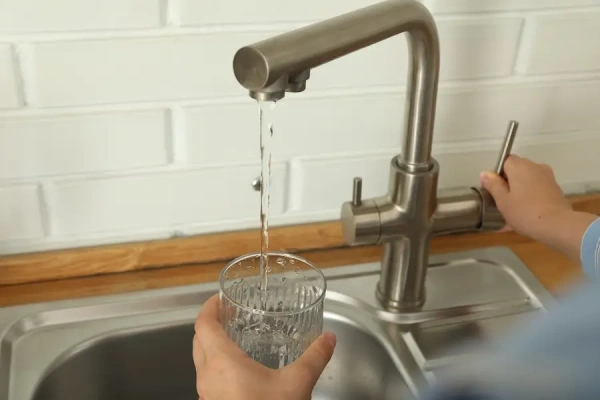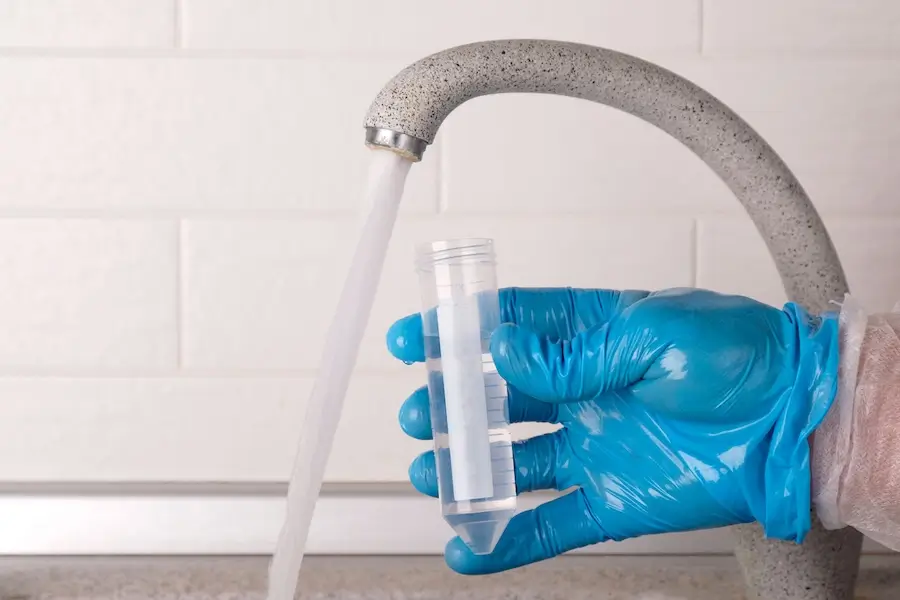
Mr. Rooter Plumbing® shares insight into how to know you have hard water and what to do about it.
|
Most people don’t consider whether their property has hard or soft water until the effects start to show. It’s often only when issues arise that we realize it’s something worth addressing.
In the guide below, you’ll learn what hard water is, how to tell if you have it, how to test for it, and the steps you can take to resolve the problem. Before long, you’ll be able to make a well-informed decision about how to manage your property’s water supply.
What Is Hard Water?
Hard water describes water with high levels of particular minerals, mainly calcium and magnesium. They occur in various forms, like sulfates, carbonates, and bicarbonates.
Hard water exists through a natural process, where water percolates through geological formations, such as gypsum, chalk, and limestone. These formations naturally feature magnesium, calcium, and other minerals.
You’re more likely to experience hard water on your property if you live in a region with limestone and chalk deposits. Residents in Ontario, Quebec, and the Prairie provinces are more likely to encounter hard water than in other parts of the country.
How to Tell If You Have Hard Water
All water looks the same, whether it’s hard or soft. By looks alone, you wouldn’t be able to tell that you have a hard water supply. So, how do you know if you have hard water? It’s all down to your experiences with the water you use every day. These are some of the most common experiences:
Toilet Bowl Stains
No matter how much you clean your toilet, it will never seem clean if you have hard water. Hard water with high iron levels can result in red/brown stains that resemble rust in porcelain toilet bowls. No matter how much you scrub or how much vinegar you apply, the stains won’t go away. Even if they do, they will return before long.
Soap Scum
It might be time to order a water hardness test if you have an abnormal amount of soap scum and calcium buildup in your kitchen and bathroom. Hard water with high calcium levels will leave white spots on surfaces after the water has evaporated. You may notice it on your shower glass and even on glassware fresh from the dishwasher.
Clothes Don’t Seem Clean
It’s easy to place blame on your washing machine when your clothes never seem to come out clean. However, the more likely culprit is hard water.
Hard water containing magnesium and calcium can make it hard for soap to wash your clothes properly. Before long, clothes and towels can appear worn out and rough. White clothes can even start to appear yellow due to iron in the water.
Clogged Shower Heads and Pipes
Hard water is more than a frustration that causes your clothing to discolour. It can also lead to costly problems with your plumbing by clogging your pipes and shower heads. Mineral deposits can build up in shower heads over time, eventually leading to pressure drops. It’s also not uncommon for older steel pipes to become clogged with scale deposits.
Dry and Itchy Skin
Exposure to hard water can take its toll on skin, particularly sensitive skin. Deposits in the water can mess with your skin’s moisture content, causing some people to develop eczema. Hard water even makes it tricky to remove all soap from your body, making your skin feel dry and itchy once you’re out of the bath or shower.
Broken Appliances
Dishwashers, water heaters, and washing machines don’t last forever. Still, they wear out long before they should when used with hard water. Scale deposits can form in water-using home appliances, leading to them wearing out quickly. Hard water can even lead to increases in your utility bills.
How to Test Water Hardness

How to know if you have hard water or not can be as simple as experiencing some of these problems above. However, you can also check water hardness with a simple test. There are three popular testing options:
The Dish Soap Method
The dish soap test is a popular home testing method that can let you know that you likely have hard water, but it won’t indicate exactly how hard the water is. Put around one tablespoon of dish soap in a clear bottle that you’ve filled one-third full with water, shake it for 10 seconds, then place it on a flat surface.
If you have soft water or water without hard minerals, there will be lots of suds in your bottle of water, but the water below it will be clear. If you have hard water, the solution won’t foam up well and will appear cloudy. This test isn’t 100% accurate and is generally just an indicator.
Water Quality Report
Water quality reports are generally readily available in regions throughout Canada. You can request your local report to learn where the water is sourced, its health effects, and the levels of contaminants. These reports can be a great indicator of whether the water in your area is considered ‘hard.’
A Water Testing Kit
There are convenient water testing kits readily available from trusted water-testing manufacturers. Obtain a kit for home use and follow the instructions to test your water. Some kits let you find out if you have hard water using a test strip in as little as five minutes. Other kits require you to send a water sample away to a certified lab. Both options can shed light on your property’s water hardness levels.
How to Soften Water
After determining that your property has a hard water supply, it’s time to explore how to soften it. Fortunately, you’re not short of options.
Install a Water Softener System
Installing a water softener system is the best option of all home and DIY water softening options.
These systems are ideal for whole-house treatment and use ion exchange to replace magnesium and calcium with potassium or sodium. There are two common types: salt-based softeners and salt-free conditioners. Salt-based softeners are the most common and effective, whereas salt-free conditioners use filters to reduce scale but don’t soften the water.
There are so many benefits of soft water systems, such as protecting your plumbing and appliances, providing cleaner dishes and laundry, softening your skin and hair, and making it easier to clean surfaces in your kitchen and bathroom.
Use a Reverse Osmosis System
A reverse osmosis system is a system that forces water through a semi-permeable membrane. This helps to remove minerals and contaminants from the water. It’s best used for drinking and cooking water at a single faucet.
Add a Water Softening Agent
If you need a quick fix while waiting for a plumber to install your new water softener system, you can add a water softening agent like borax or washing soda. This is suitable for cleaning tasks and laundry, but not for drinking water or long-term use.
Boiling Water
If you need a small batch of soft water, such as for topping up an aquarium, boil it. Boiling water can remove temporary hardness resulting from bicarbonates. However, it doesn’t take away permanent hardness from sulfates and chlorides.
Contact Mr. Rooter Plumbing® for Water Softener Installation, Repairs, and Replacement
Hard water can take a serious toll on your appliances, clothing, skin, and hair. The good news is that you don’t have to put up with it any longer. Contact the expert team at Mr. Rooter Plumbing® for water softener installations, repairs, and replacement. We look forward to helping you get the soft, gentle water supply you deserve.

